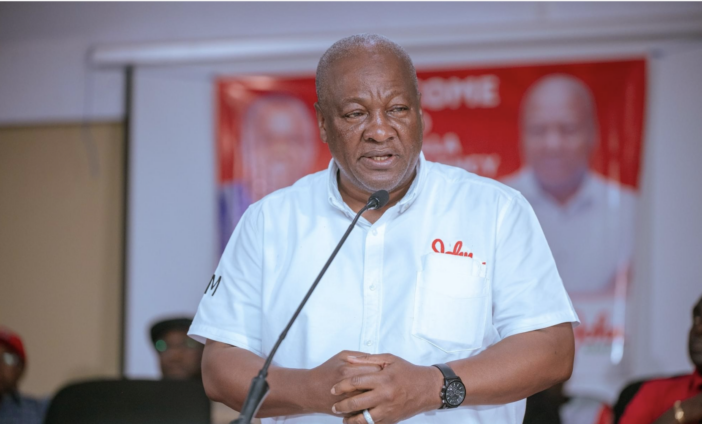Former President John Dramani Mahama has once again highlighted his commitment to transforming Ghana’s economy with an innovative and ambitious 24-Hour Economy Policy.
“This game-changing initiative, outlined under the next National Democratic Congress (NDC) government, seeks to revitalize key sectors and create a robust economic framework capable of driving sustainable growth”.
He said at the heart of the policy was a deliberate strategy to stimulate economic activity by enabling businesses and public institutions to operate around the clock in three eight-hour shifts.
“This 24-hour operational model is designed to increase employment, productivity, production, and revenue, while enhancing access to public services”.
In a recent address, Mahama emphasized the transformative potential of this policy. “The 24-Hour Economy is more than just a policy; it’s a catalyst for industrialization, export promotion, and job creation. It’s about building an economy that works for everyone, every hour of the day,” he said.
The 24-Hour Economy focuses on key sectors such as agro-processing, manufacturing, pharmaceuticals, construction, financial services, and more.
Strategic investments in infrastructure, energy, and security will provide the foundation for businesses to thrive. Public institutions with high customer traffic, such as ports, customs, and the DVLA, will also operate around the clock to enhance efficiency.
He said to ensure seamless implementation, an Accelerated Export Development Authority (AEDA), chaired by the President, would oversee export promotion efforts under this strategy.
“Additionally, a new Employment Act will be enacted in consultation with organized labor and stakeholders to complement existing labor laws and regulate the 24-hour economy effectively.
Mahama’s 24-Hour Economy Policy is underpinned by a comprehensive support package for businesses. Participating enterprises will benefit from tax incentives, financing support through the Ghana Exim Bank, and cheaper electricity rates based on a Time-of-Use tariff system.
The government will also promote the “Made in Ghana Agenda” by prioritizing local goods, thereby stimulating domestic demand and fostering a sense of national pride.
The policy also addresses workers’ welfare by promoting good work ethics and ensuring efficient eight-hour shifts across public and private sectors.
Mahama’s vision prioritizes sustainable, decent-paying jobs that empower individuals and strengthen families.
“The Policy reflects his forward-thinking approach to governance and economic development. By focusing on import substitution, export promotion, and industrialization, he seeks to position Ghana as a competitive player in the global economy.”
Latest Stories
-
We’re not leaving until EOCO releases Wontumi – NPP supporters vow
55 minutes -
Wontumi was arrested in a rambo style as if he’s a terrorist – Nana B
1 hour -
Trump administration seeks to pull estimated $100m in Harvard funding
1 hour -
Trump administration halts scheduling of new student visa appointments
2 hours -
Nana Fredua-Agyeman Jnr. eulogises Nana Kwasi Gyan-Apenteng
2 hours -
NPP supporters attack JoyNews reporter during Wontumi’s EOCO detention coverage
2 hours -
Security tightened at EOCO as tension mounts over Wontumi’s arrest
2 hours -
AG files motion to strike out suspended CJ’s supplementary affidavit
2 hours -
Lamine Yamal signs 6-year extension at Barcelona
2 hours -
NPP supporters attack police pickup trucks at EOCO head office
2 hours -
Wontumi’s arrest by EOCO likely linked to suspected money laundering – Kpebu
3 hours -
A/R: Fire destroys several apartments at Bomso
3 hours -
Scores of NPP supporters storm EOCO office over Wontumi’s arrest
3 hours -
Consumer Protection Agency commends FDA for crackdown on dangerous fake diapers
4 hours -
Two jailed 14 years for defilement in disturbing ‘money charm’ case
4 hours

